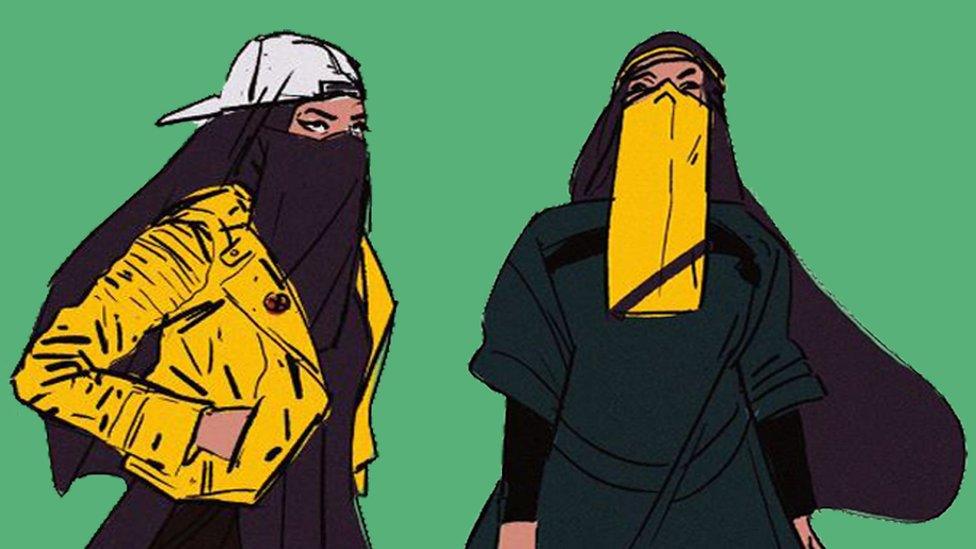Transformers: Misfit robots and the women who love them
- Published
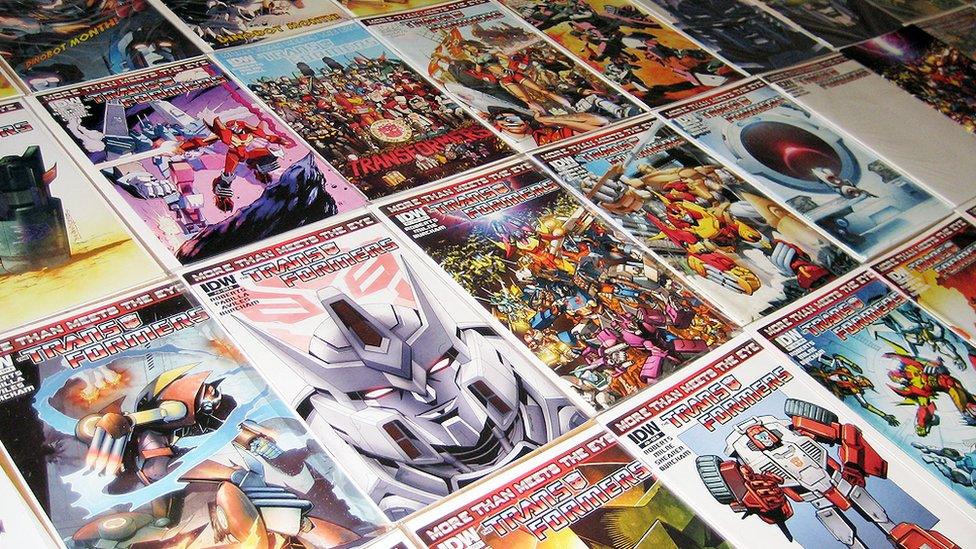
Over three decades Transformers has grown from a line of children's toys to a media franchise encompassing film, TV and gaming. Perhaps its most radical spin-off though is a comic that has used wit and humanity to reach a new, diverse fan base.
Transformers started out as a boy's toy. The robot characters, which could be quickly reconfigured into guns and cars - tapped into the young male zeitgeist of 1984.
Those children have grown into today's adult collectors. But thanks to a cult comic, the franchise's male-dominated audience has crossed the gender divide.
At Europe's largest Transformers convention this year, TFNation, women accounted for almost half of attendees aged 21 to 31. It caps a three-year trend in which female attendance grew by a third. Taking the credit is the comic Lost Light.
But how can a humble comic trigger such a turnaround?
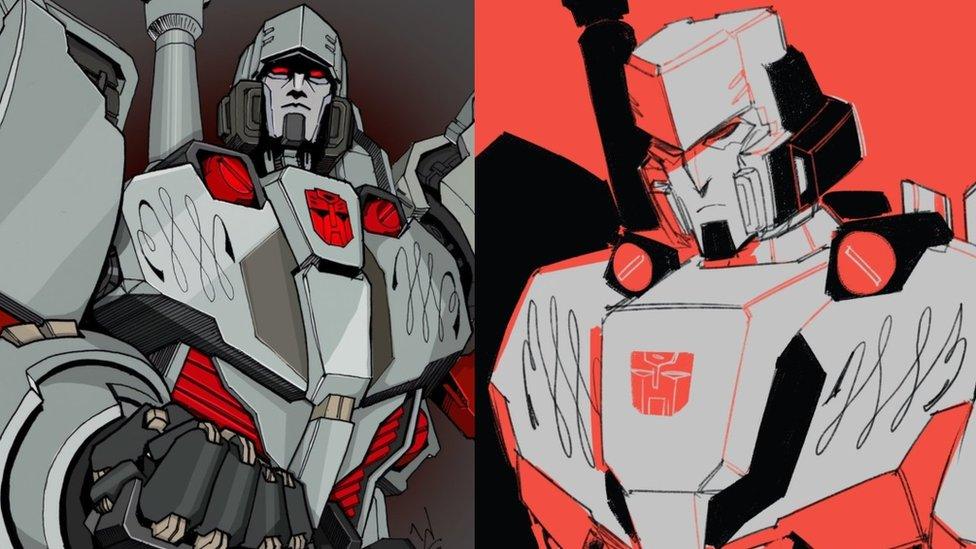
Writer James Roberts points to the "redemption arc" of Megatron - the original Transformers villain - as one of the comic's most political stories
Unlike much other sci-fi media, Lost Light and the community which has grown around it, made women feel "invited to share in this world".
So says female fan Alex Cole, a freelance animator whose fan-made "trailers" for the comic have racked up hundreds of thousands of views on YouTube, external.
Compared with the comic books of her childhood, in which regularly "some sexist trope showed up to upset me and pull me out of the story", Lost Light made "a wider variety of people feel welcome," she says.
"It helps that the female characters are written the same way as others and being gay is basically the default."
Although the comic came to an end last week, its influence is "going to stay with people" she says.
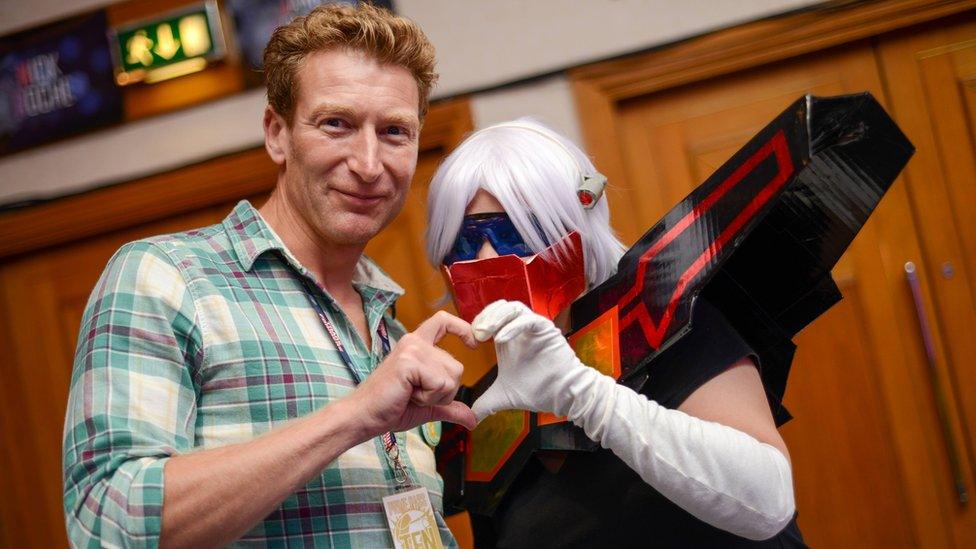
Writer James Roberts: "I've been struck by the passion of fans, how sincere they are"
Responsible for much of this is the comic's author, James Roberts, who penned all 80-odd issues.
Although the stories are infused with a British sci-fi humour - BBC TV comedy Red Dwarf was a major influence - his ambition for the publication, which tackled topics such as same-sex relationships, freedom and self-determination, was "unashamedly political".
"Misfits and also-rans, in an enclosed space with a pitch-able quest - it's a good way into a story," says Roberts. "This is the difference between American and British sci-fi and comics, and TV shows like The Hitchhiker's Guide to the Galaxy and the new Doctor Who - their love of language, puns, banter.
"You can get away with more swear words if they're British."
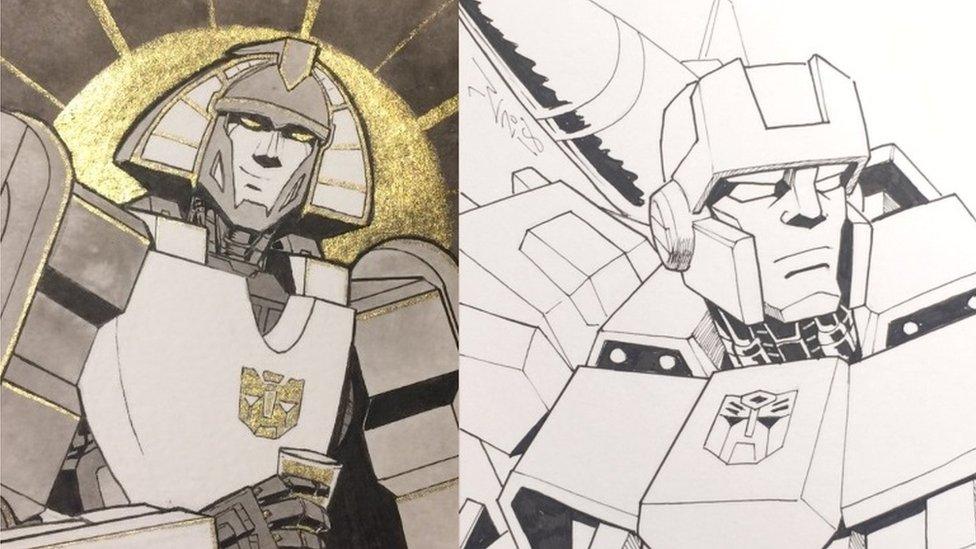
As well as original characters, Autobots from 1984 such as Mirage and Hound are Lost Light crew members
One prominent fan agrees Roberts' work has encouraged "people who would not normally attend Transformers conventions to make the trip".
"It has made them more visible," says Transformers blogger and photographer Maziar Shahsafdari. "The mature way in which representation, diversity, issues of mental health, politics, sexuality, gender and more were presented throughout the series really helped."
But political themes alone do not explain Lost Light's influential reach.
Social media has also provided a link between the fans and the comic's creators.
Roberts, along with artists Alex Milne and Jack Lawrence, engage with their audience online, external. Every October, for a month, fans are encouraged to post their art of the Transformers characters, tagging them #LostLightFest.
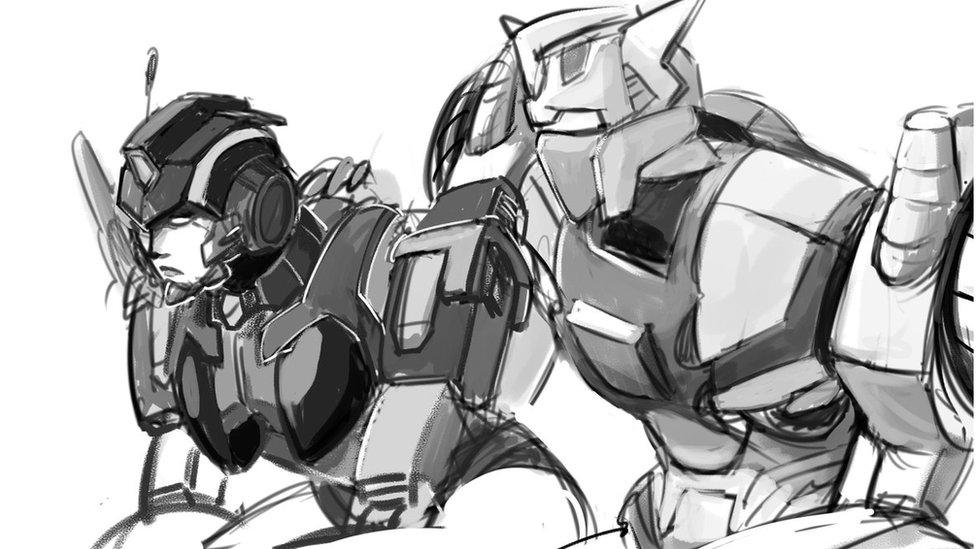
Fans have been drawn to Roberts' belief in "character-driven story" which has seen as many robots go through painful loss as interstellar gags
Transformers' cornering of a young female fan base chimes nicely with the values of today's #MeToo era. But that interpretation would miss the vision of those involved.
Lost Light emerged after its publisher, which ran the Transformers comic licence for toy giant Hasbro, decided to experiment. Its lifespan was initially judged to be no more 12 issues.
"I was keen to fill out the cast with relative unknowns," says Roberts, of the Transformers character set. "It would give it a bit of tension, a mix of distinct personalities."
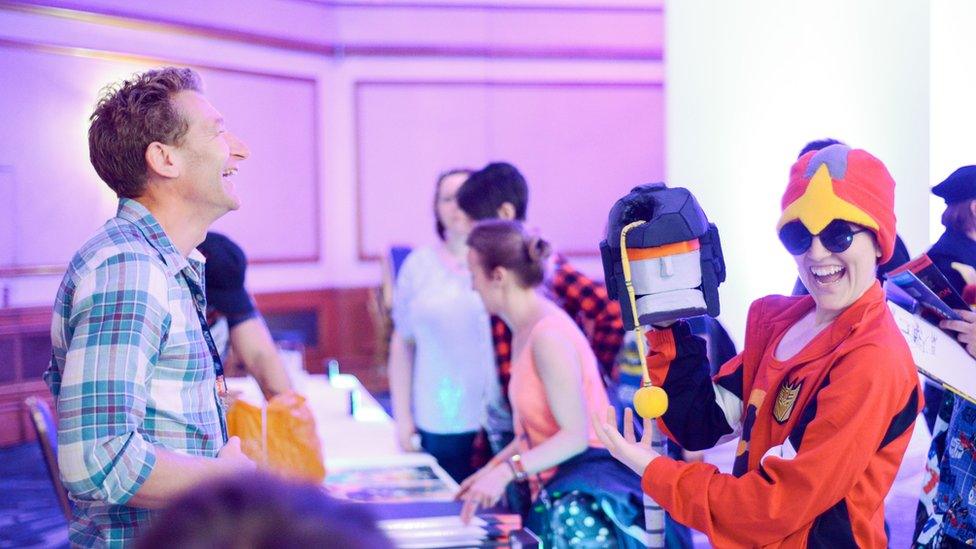
Without the fans, "we'd have got to 12 issues and stopped", says Roberts
The publisher wanted the comic "to speak to Transformers fans and beyond," he says.
Roberts was given the freedom to look beyond the A-list of characters. And with that came the opportunity to take more chances.
An initial positive reception emboldened Roberts, leading to his favourite moment - issue 16, the "declaration of love" between two same-sex Transformers characters, Chromedome and Rewind. It was "a first".
"In the nicest possible way, it became normalised. The world didn't come to an end. That reaction gave me and others the confidence to tell more stories like this," says Roberts.
There was some concern about what Hasbro, a toy maker with a long history and a wholesome, family-friendly image, would make of this turn of events. But head office appeared remarkably unruffled, says John Barber, Lost Light's publisher.
"The company's vice-president of global publishing said something to the effect of: 'I asked you guys to make the characters human and you have'," recalls Barber.
However, as ground-breaking as the relationship between these two robot characters was at the time, it escaped official definition. Until now.
"As far as I'm aware they're gay," says Barber, though he insists he does not want to "label" any reader's impression of the pair.
"It's important everyone can see themselves in the stories they read, and also to see people with other perspectives and different lives."
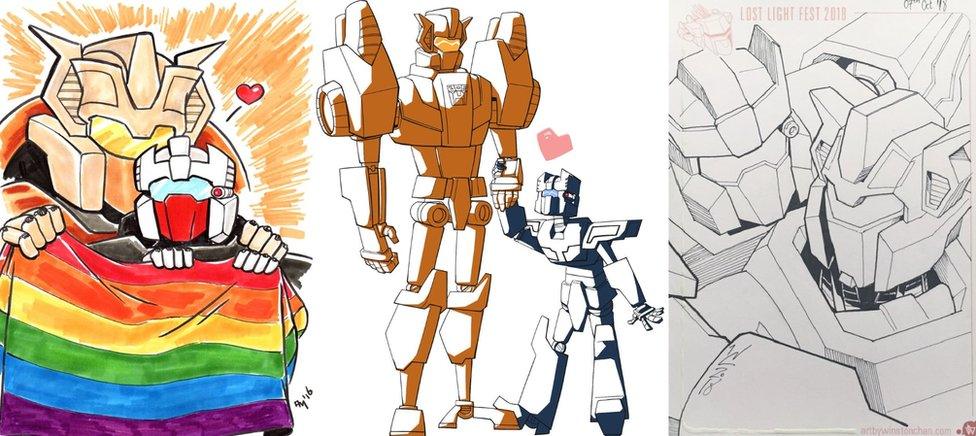
Chromedome and Rewind have been a touchstone for fans and given Roberts his favourite moment
The message that something radical and new was happening in a mainstream sci-fi franchise began to build.
The quality of the publication "reached a different audience", says James Wilson, manager of Orbital Comics store in London, particularly among those who would normally be "put off by a licensed property like Transformers".
The proof is evident in the comments of online fans such as @Themanlylobster. She says Lost Light got her "reconnecting with old friends, which led to me getting a job, then proper housing".
She adds: "It made me want to start drawing again."
A fellow artist and contributor to the #LostLightFest, @raadst, is proud the comic presents LGBT characters and mental health issues as "the norm". Likewise, @sierenthe says she joined Twitter and Tumblr to join the "wonderful sense of supporting each other" among Lost Light fans.
Long-standing male robot fans, such as Transformers YouTuber Thew Adams, agree. Including empowered female and transgender robots has helped female and LGBT fans "join in the discussion", says Adams.
"It has encouraged me to engage with different kinds of people and begin to understand societal issues I was largely unaware of. Something as seemingly daft as Transformers has opened my eyes so much.
"Of course, there's enough space adventure and robot action to satisfy the sci-fi kids!"
"A lot of readers have said seeing same-sex relationships portrayed in a normal, incidental way has been really positive," says Roberts. He recalls conversations with fans in which they said it had "helped them come out, come to terms with their sexuality and meet other people".

Rodimus and Drift were portrayed as flash heroes, but Roberts skewed them with humour and pathos
And those "other people" have become a community in their own right.
Cole and Dusty Stowe, of US band Retronym, external, who wrote and recorded a song called Lost Light with the help of a choir of dozens of fans, each cite the comic's "good-hearted, creative fandom" as helping their work.
But now the comic that broke down gender barriers is winding up.
"We had a good run," says Roberts, who feels 80 issues is more than can be expected in today's industry.
"I'm always going to be proud about what we have all achieved."
.
- Published27 October 2018
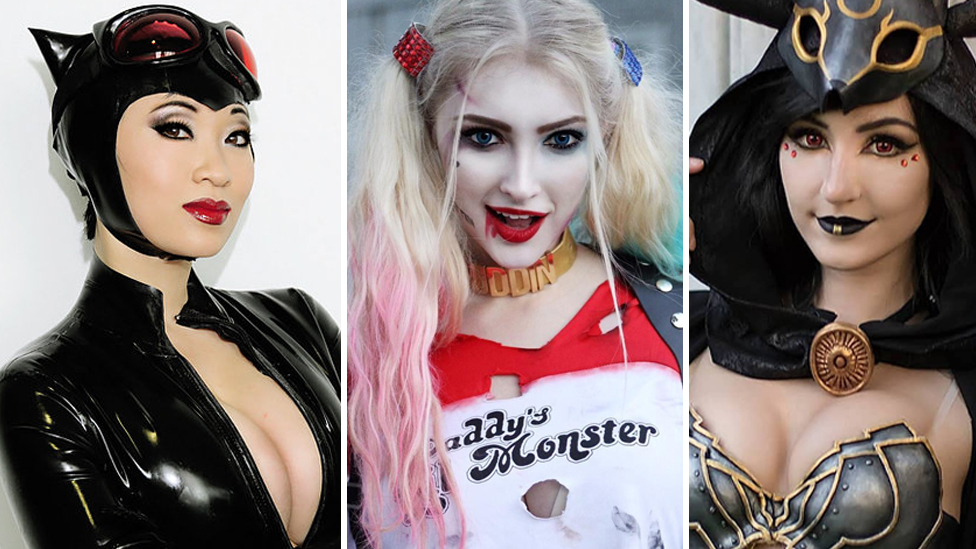
- Published4 September 2018

- Published29 August 2018
